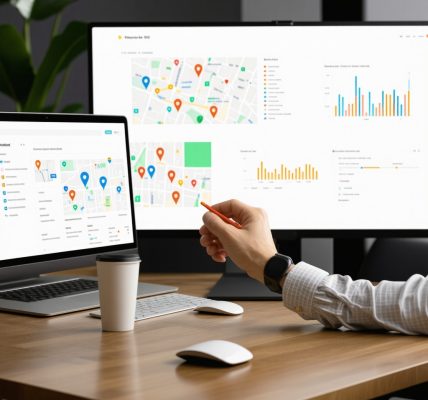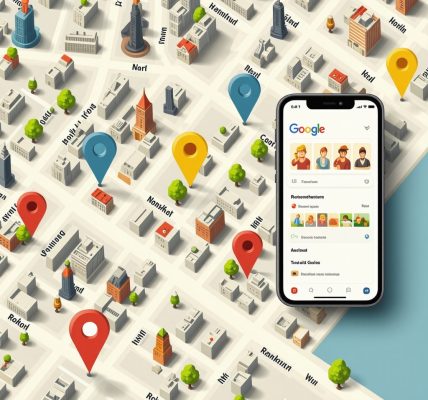Elevating Local Search Visibility Through Strategic GMB Optimization
In today’s hyper-competitive digital landscape, securing a prominent position in local search results is essential for businesses aiming to attract nearby customers. Google My Business (GMB) stands as the cornerstone platform that directly influences local search rankings and visibility, making its optimization not only beneficial but indispensable. Advanced GMB optimization integrates detailed business data, user engagement tactics, and SEO best practices to amplify local relevance and authority.
Decoding the Complex Factors Behind GMB Ranking Algorithms
Google’s local search algorithm evaluates a multitude of signals, with GMB profile completeness and accuracy playing pivotal roles. Key ranking factors include the consistency of Name, Address, and Phone Number (NAP) citations across the web, proximity to the searcher, and relevance of business categories chosen within GMB. Additionally, engagement metrics such as review quantity, quality, and response rate critically affect positioning. Understanding these nuanced ranking determinants enables the crafting of a GMB profile that resonates with both users and search engines.
What Advanced Techniques Can Maximize GMB Profile Performance Beyond Basics?
Beyond foundational setup, leveraging targeted keyword strategies in your business description and services can improve discoverability for specific local queries. Incorporating geo-modifiers and semantic keywords organically within your profile content aligns with search intent and enhances relevance. Furthermore, regularly updating GMB posts with timely offers and news sustains user engagement and signals active management to Google. Employing expert citation services ensures authoritative backlinks and citation consistency, further elevating local SEO strength. These layered approaches are supported by data-driven methodologies and align with insights from leading SEO authorities such as Moz (Moz Local SEO Guide).
Integrating User-Generated Content and Review Management for Trust and Authority
Review generation and management transcend mere reputation building; they are integral to GMB optimization for local ranking. High volumes of positive, authentic reviews paired with prompt, professional responses increase your profile’s credibility and influence Google’s trust signals. Encouraging customers to include relevant keywords in reviews further reinforces semantic relevance. Implementing effective review generation strategies, as detailed in expert guides, can significantly boost your local search presence and customer conversion rates.
Leveraging Data Analytics and Performance Metrics to Refine GMB Strategies
Continuous monitoring of GMB insights — including search queries, customer actions, and photo views — allows for iterative optimization. Analyzing which keywords and content formats drive engagement supports informed adjustments to your profile. Tracking performance over time helps identify growth opportunities and address ranking stagnation proactively. Advanced SEO practitioners utilize these analytics to tailor local campaigns with precision and measurable outcomes.
For a comprehensive dive into optimizing your Google Business Listing effectively, explore our detailed guide at rankingseogmb.com. Share your own professional insights or experiences with GMB optimization in the comments to contribute to this evolving expertise community.
Harnessing AI and Automation in Google My Business Management
As the digital landscape evolves, integrating artificial intelligence (AI) and automation tools into Google My Business management has become a game-changer for local SEO professionals. AI-driven platforms enable businesses to streamline routine tasks such as review monitoring, keyword optimization, and post scheduling, ensuring consistent and timely engagement.
By leveraging natural language processing (NLP), AI can analyze customer reviews to extract sentiment trends and relevant keyword opportunities, allowing businesses to respond more strategically and personalize their communication. This proactive approach not only enhances customer experience but also signals to Google an active and attentive business presence, which can positively influence rankings.
Moreover, automation in citation management helps maintain NAP consistency across numerous directories, a critical factor in local search authority. Tools that automatically update business information across platforms reduce the risk of outdated or conflicting data, a common pitfall that can undermine SEO efforts.
Building Local Authority Through Strategic Link Acquisition
Link building remains a cornerstone of SEO, and when applied thoughtfully to local SEO and GMB optimization, it can significantly elevate a business’s local authority. Prioritizing high-quality backlinks from reputable local sources such as chambers of commerce, local news outlets, and community organizations enhances domain authority and relevance.
Creating localized content collaborations, sponsoring community events, or contributing expert insights to local publications are effective tactics to earn authoritative backlinks. These links not only drive referral traffic but also improve trustworthiness signals that Google evaluates for local rankings.
Integrating such link-building strategies with consistent GMB citation efforts forms a robust local SEO foundation. This approach complements the optimization techniques discussed earlier, reinforcing your business’s credibility both on and off Google’s platforms.
How Can Emerging Trends Like Voice Search and Hyperlocal Targeting Shape Your GMB Strategy?
With the rise of voice-activated assistants and mobile search dominance, voice search optimization is becoming increasingly vital. Queries tend to be more conversational and location-specific, demanding that GMB profiles are optimized with natural language keywords and complete, precise business information.
Hyperlocal targeting, focusing on neighborhoods or districts rather than broader geographic areas, requires granular optimization. Businesses must ensure their GMB profiles reflect hyperlocal identifiers and leverage localized content and offers to capture these niche searches effectively.
Adapting to these trends involves continuous keyword research and dynamic content updates, aligning with evolving user behaviors. For in-depth strategies on leveraging GMB for hyperlocal SEO, visit rankingseogmb.com.
Practical Implications: Crafting a Multi-Dimensional GMB Optimization Plan
Implementing a multi-faceted GMB strategy that incorporates AI automation, authoritative link building, and voice search adaptation requires meticulous planning and execution. Start by auditing your current GMB performance utilizing tools like Google Analytics and GMB Insights to pinpoint strengths and weaknesses.
Next, integrate AI tools to automate review responses and citation updates, freeing up resources for strategic outreach and content creation. Concurrently, develop partnerships with local entities for backlink opportunities and curate content tailored for voice search queries.
Ongoing performance tracking and iteration are crucial to maintaining and improving your local search presence. For expert guidance on auditing and refining your GMB profile, consider exploring our comprehensive resources at rankingseogmb.com.
By embracing these advanced techniques, businesses position themselves at the forefront of local SEO innovation, securing sustainable growth and competitive advantage.
We invite readers to share their experiences or questions about integrating AI and local link building in GMB optimization in the comments below. Your insights enrich our professional community and foster deeper understanding.
Exploring the Synergy Between AI-Driven Insights and Hyperlocal SEO Precision
As Google My Business (GMB) optimization matures, leveraging artificial intelligence for hyperlocal SEO refinement unlocks unprecedented precision in targeting. AI-powered tools analyze user behavior patterns and local search trends to dynamically tailor business profiles that resonate with micro-geographic audiences. This capability transcends static keyword implementation, enabling real-time adaptation to evolving search intents within neighborhoods or districts.
For instance, AI can identify emerging local events or seasonal shifts influencing customer queries, allowing businesses to update GMB posts and offers proactively. These automated yet contextually nuanced updates ensure that your profile remains relevant and authoritative in the eyes of both users and Google’s algorithm. Moreover, integrating AI with hyperlocal keyword research facilitates uncovering latent semantic indexing (LSI) terms that are often overlooked but highly impactful for voice search optimization.
How does AI enhance semantic keyword discovery for GMB voice search optimization?
Natural Language Processing (NLP) models analyze large volumes of conversational data from voice assistants like Google Assistant and Siri, extracting common phrasing and colloquialisms used in voice queries. This analysis enables the identification of semantic keywords and question-based phrases that traditional SEO tools might miss. Incorporating these insights into your GMB description, services, and FAQs not only improves voice search visibility but also aligns your content with authentic user language, boosting engagement and conversion rates.
According to a 2023 study by Search Engine Journal, businesses employing AI-driven semantic keyword strategies saw up to a 30% increase in local voice search traffic within six months (Search Engine Journal, 2023).
Harnessing Structured Data and Schema Markup to Amplify GMB Signals
Beyond content and keywords, implementing structured data using schema markup on your website complements GMB optimization by providing explicit context to search engines. Schema types like LocalBusiness, OpeningHoursSpecification, and GeoCoordinates enrich your online presence with machine-readable data, enhancing your chances of appearing in rich snippets and local packs.
Strategically embedding schema markup bridges your website’s authority with your GMB profile, creating a cohesive ecosystem of trust signals. This practice addresses the complexity of Google’s understanding of local relevance and business authenticity, which influences ranking algorithms profoundly. Advanced local SEO specialists recommend routine audits of schema implementation to prevent errors that may dilute these benefits.
Strategic Multi-Location GMB Management: Challenges and Scalable Solutions
Enterprises operating multiple physical locations face unique hurdles in maintaining GMB consistency and optimization at scale. Aggregating data, ensuring NAP uniformity, and tailoring each location’s profile to its specific local context demand sophisticated management frameworks. Utilizing centralized GMB management platforms integrated with AI-driven monitoring can automate bulk updates, review responses, and citation synchronization, reducing manual overhead.
Furthermore, leveraging geofencing techniques allows for location-specific promotions and targeted GMB posts that reflect hyperlocal nuances. This granular approach drives engagement and conversion by addressing the distinct preferences and search behaviors of individual communities within a broader service area.
These scalable solutions empower national or regional brands to maintain high local SEO standards without sacrificing customization or responsiveness.
Curious to delve deeper into structuring multi-location GMB strategies? Our expert resources at rankingseogmb.com offer comprehensive frameworks and case studies.
Decoding AI-Enhanced Semantic Keyword Mapping for Voice-Activated Local Queries
In the realm of voice search, semantic keyword discovery transcends traditional SEO paradigms by capturing the natural, conversational nuances of user queries. AI-powered Natural Language Processing (NLP) models mine extensive datasets from voice assistants to uncover latent semantic keywords and question formulations users employ when seeking local services. Integrating these insights into your GMB business descriptions, services, and FAQs allows your profile to resonate authentically with voice searchers’ intent, significantly enhancing visibility and engagement.
Employing Structured Data and Schema Markup to Fortify Local Business Signals
Structured data implementation, particularly through schema markup, functions as a pivotal bridge linking your website’s authority with your Google My Business profile. Utilizing schema types such as LocalBusiness, OpeningHoursSpecification, and GeoCoordinates enriches your digital footprint with machine-readable context that search engines use to generate rich snippets and enhance local pack appearances. Regular audits to ensure error-free schema markup are indispensable to safeguard these SEO advantages and maintain signal integrity.
Streamlining Multi-Location GMB Governance with Scalable AI Solutions
Managing multiple GMB listings across diverse geographic locations presents intricate challenges, including NAP consistency, localized content relevance, and review management at scale. Advanced centralized management platforms integrated with AI-driven automation can synchronize bulk updates, optimize review responses, and maintain citation uniformity efficiently. Additionally, geofencing-enabled hyperlocal content and promotional targeting empower brands to address specific community preferences, optimizing engagement and conversion with precision.
What are the cutting-edge strategies for integrating AI automation with hyperlocal GMB content customization?
Leading-edge approaches entail deploying AI tools capable of real-time analysis of hyperlocal search trends and user behavior to dynamically tailor GMB posts and offers at the neighborhood level. Machine learning algorithms can segment audiences by micro-geographies, enabling the creation of bespoke content that reflects localized events, seasonal demands, and community sentiments. This granular personalization not only bolsters relevance but also enhances Google’s perception of active, contextually aware business management.
For an authoritative exploration of AI-driven local SEO innovations, consider insights from Search Engine Land’s comprehensive analysis, a leading publication renowned for its specialized coverage of search marketing advancements.
Engage with these sophisticated methodologies today to elevate your GMB strategy beyond conventional boundaries. Share your experiences or pose intricate questions in the comments to join our expert community in pioneering the future of hyperlocal SEO.
Expert Insights & Advanced Considerations
Leveraging AI for Dynamic Hyperlocal Adaptation
Integrating AI-driven analytics into your Google My Business strategy enables real-time responsiveness to micro-geographic shifts in consumer behavior and search intent. This dynamic adaptation transcends static keyword usage, allowing businesses to tailor GMB posts, offers, and service descriptions to hyperlocal nuances, enhancing relevance and engagement within specific neighborhoods or districts.
Structured Data as a Critical SEO Signal Amplifier
Implementing comprehensive schema markup such as LocalBusiness and OpeningHoursSpecification enriches your website and GMB profile with machine-readable context. This synergy bolsters Google’s understanding of your business authenticity and local relevance, increasing the likelihood of rich snippet appearances and higher local pack rankings.
Scalable Multi-Location Management with AI Automation
For enterprises managing numerous physical locations, AI-powered centralized platforms streamline bulk updates, citation consistency, and review management. This approach ensures each location maintains optimized, localized content without sacrificing scalability, preserving brand integrity while capturing local search advantages.
Semantic Keyword Discovery for Voice Search Optimization
Natural Language Processing (NLP) models uncover conversational and question-based phrases prevalent in voice queries. Integrating these semantic keywords into your GMB descriptions and FAQs aligns your business profile with authentic voice search language, significantly improving visibility and user engagement in voice-activated local searches.
Curated Expert Resources
- Moz Local SEO Guide: A definitive resource for mastering citation management and local SEO fundamentals, providing actionable strategies for consistent NAP and authoritative backlinks (https://moz.com/learn/seo/local-seo).
- Search Engine Land: AI Innovations in Local SEO: Offers specialized analyses on integrating AI automation and machine learning to enhance GMB management and hyperlocal content personalization (https://searchengineland.com/ai-local-seo-innovations-408820).
- Ranking SEO GMB Comprehensive Guides: A suite of expertly curated articles covering multi-location GMB management (rankingseogmb.com/multi-location-gmb-management-best-practices), advanced citation services (rankingseogmb.com/expert-gmb-citation-services-for-enhanced-rankings), and cutting-edge keyword strategies (rankingseogmb.com/google-business-keyword-strategy-drive-more-quality-leads-easily).
- Search Engine Journal: AI and Voice Search SEO: Provides empirical data and case studies on the impact of AI-driven semantic keyword strategies on local voice search traffic (https://www.searchenginejournal.com/ai-voice-search-local-seo/485763/).
Final Expert Perspective
Mastering Google My Business optimization today demands a sophisticated blend of AI integration, semantic keyword strategy, structured data implementation, and scalable multi-location management. These advanced methodologies collectively elevate local search visibility, enrich user engagement, and fortify your business’s authoritative presence within Google’s ecosystem. Embracing these expert tactics ensures that your GMB profile not only ranks higher but also adapts fluidly to evolving search behaviors, including voice and hyperlocal queries.
To deepen your mastery, explore our comprehensive resources like how to optimize your Google Business listing effectively and effective GMB ranking strategies to elevate your business. Engage with the community by sharing your advanced insights or discussing nuanced challenges in GMB optimization. Together, we can push the boundaries of local SEO expertise and secure sustainable competitive advantage in the digital marketplace.



